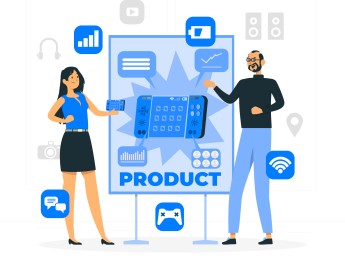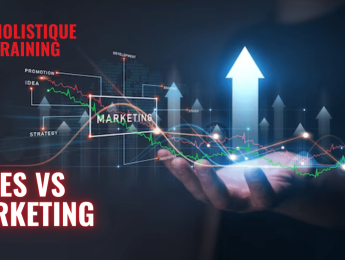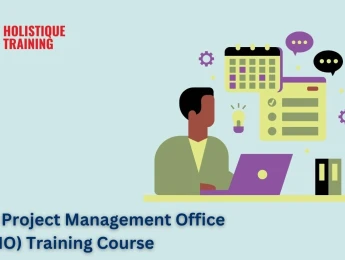Launching and managing a product’s journey in a business-to-business environment can be tricky. Although you may have the authority to put plans into practice in your own organisation, you have no power over other companies to buy into or implement your strategies or to purchase your products.
To gain support from external parties and work towards continuous improvement across your partnerships, you should develop an accurate and proven project framework, including workable budgets, steps to change, risk assessments to mitigate problems, and monitoring processes to allow you to review and amend your product and stay flexible.
When it comes to bringing brand-new products to market and gaining the trust of your stakeholders, you also need to develop an effective marketing deck to sell your benefits and functions, roll out exact timelines for prototypes and create direct-to-market plans. To sell your resourcing model to your supporters requires careful consideration, so they understand the full financial undertaking and the level of engagement required to create a return on investment.
Upon completion of this course, participants will be able to:
- Develop essential sales knowledge to generate support for a product.
- Discover how to match stakeholders and partners to a winning product.
- Set out a budget for materials and resources to set client expectations.
- Familiarise yourself with product roll-out and creation procedures.
- Understand the importance of effective marketing.
- Demonstrate the benefits and functions of a product to meet market requirements.
- Analyse and monitor the success of a product and recognise where changes need to be made.
- Evaluate your procedures and implement a ‘lessons learned’ structure for continuous improvement.
This course is perfect for people who control their own product design and marketing structure or business owners looking for insight into strategic thinking processes to build successful product-to-market frameworks. It would be especially beneficial for:
- Product Managers
- Marketing Directors
- Business Owners
- Development Managers
- Change and Control Managers
- Technical Experts
- Marketing Executives
- Sales Directors
- Product Designers
This course provides access to various practical exercises and presentations to enhance your learning. You will view real-life case studies from companies that have brought products to market and see how to recover from less successful product management strategies.
You will utilise your new skills through group workshops to develop project plans and apply your product and leadership knowledge to create a strategic framework for your own project rollout.
Day 5 of each course is reserved for a Q&A session, which may occur off-site. For 10-day courses, this also applies to day 10
Section 1: Managing B2B Relationships
- Your role as a product manager.
- Building trust between your team and your partners.
- Targeting the right people to buy your product.
- Understanding your stakeholder’s motivation.
- Keeping an open mind and a two-way relationship.
- Enhance your listening skills.
Section 2: Creating a Sellable Marketing Plan
- Evaluating market drivers.
- Setting strategic objectives.
- Cost-benefit analysis.
- Identifying and mitigating risks.
- Selling your success factors.
- Telling isn’t selling – using relevant examples.
Section 3: Strategic Thinking – Staying One Step Ahead
- What is strategic thinking?
- Creating superior value propositions.
- Opportunities based on your product’s value.
- Staying above the competition.
- Six Sigma organisation to move forward.
- Prioritisation, sustainability, and profitability.
Section 4: Negotiation, Influencing & Persuasion Techniques
- Enlisting help from your sales team.
- Understanding the difference between ‘wants’ and ‘needs.’
- Benefits vs. functions.
- Changing negative perceptions.
- Roleplaying to combat a difficult investor.
- Using persuasive language patterns.
- Removing negativity.
Section 5: Market Research to Maintain Value
- Using analytics to find gaps in the market.
- Tailoring your marketing strategy to your audience.
- Review advertising methods to reach out to your consumer base.
- Social media and its uses.
- Programmatic advertising.
- Reviewing surveys and feedback.
Section 6: Your Product’s Lifecycle
- Design ideas.
- Consumer segmentation.
- Identifying gaps in the market.
- Your budget and costs against pricing models.
- Resource models, communications, and staffing.
- Marketing essentials.
- Managing your customer relationships.
Section 7: Monitoring & Evaluation
- Document analytics-based results.
- Revisit pain points and review where improvements are required.
- Identify your key success factor and embellish it.
- Your product against your competitors.
- Managing an innovative portfolio.
Upon successful completion of this training course, delegates will be awarded a Holistique Training Certificate of Completion. For those who attend and complete the online training course, a Holistique Training e-Certificate will be provided.
Holistique Training Certificates are accredited by the British Assessment Council (BAC) and The CPD Certification Service (CPD), and are certified under ISO 9001, ISO 21001, and ISO 29993 standards.
CPD credits for this course are granted by our Certificates and will be reflected on the Holistique Training Certificate of Completion. In accordance with the standards of The CPD Certification Service, one CPD credit is awarded per hour of course attendance. A maximum of 50 CPD credits can be claimed for any single course we currently offer.
- Course Code PM1-105
- Course Format Classroom, Online,
- Duration 5 days














